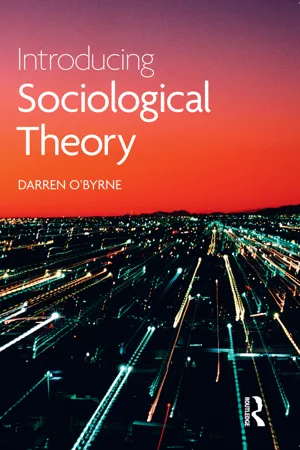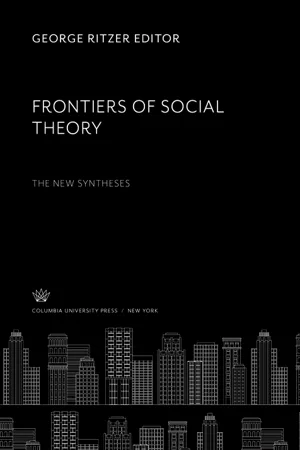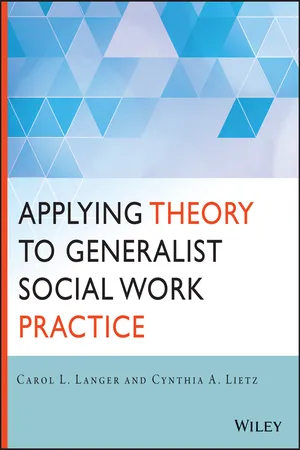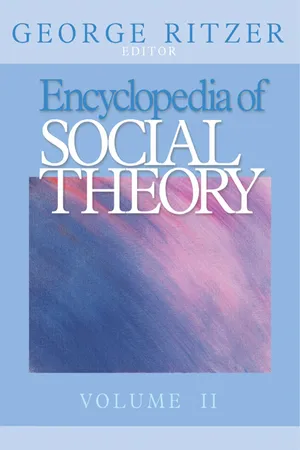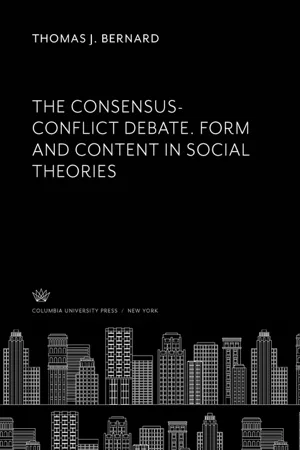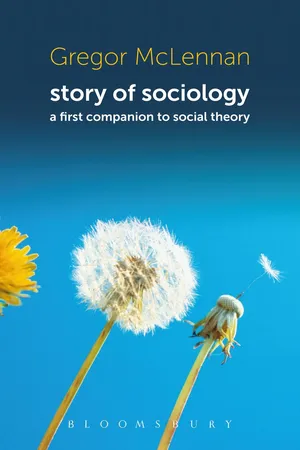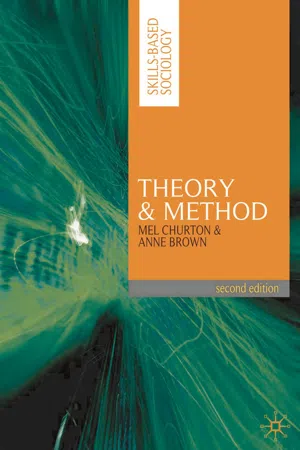Social Sciences
Conflict Theory Culture
Conflict theory culture refers to the perspective that culture is shaped by power struggles and inequalities within society. It emphasizes how dominant groups use culture to maintain their position and control over resources, while marginalized groups may resist or challenge these cultural norms. This approach highlights the role of culture in perpetuating and reinforcing social conflicts and inequalities.
Written by Perlego with AI-assistance
Related key terms
1 of 5
7 Key excerpts on "Conflict Theory Culture"
- eBook - ePub
- Darren O'Byrne(Author)
- 2013(Publication Date)
- Routledge(Publisher)
is , namely, riddled with conflict. In actual fact, among those we can list as conflict theorists, some, such as C. Wright Mills, are clearly quite radical as they want to expose the stark inequalities and abuses of power in society. Some, such as Rex and many of those British Weberians, are a bit more centre-left: they highlight inequalities but don’t necessarily endorse a radical overhaul of the system. A number of them, including Ralf Dahrendorf, are more identifiably liberal in their politics: they believe that while conflicts are an inevitable part of society, these can be effectively contained within the Western liberal democratic model of government (in the related discipline of political science, such an approach is known as ‘pluralism’). But there are also some quite conservative contributions to conflict theory that have appeared in recent years: Samuel Huntington’s ‘clash of civilisations’ thesis, which has inspired American neo-conservative academics and politicians to worry that cultural diversity might stifle ‘Western values’, can be read in this vein.So, to summarise, in this chapter we are looking at a sociological viewpoint which defines its subject matter – society – as an arena of contestation, akin to professional wrestling’s ‘King of the Ring’ competitions, in which the participants are actively trying to promote their own interests vis-à-vis those of their rivals. The interests being promoted can be political, economic or cultural in character – the point is that there is no ‘consensus’ which defines any one society, but a plurality of opinions and values. How one should react to this world of difference is a question of ideology, not sociology. In order to grasp what conflict theory tells us about society, particularly through its single most important concept, that of the interest group - George Ritzer(Author)
- 2019(Publication Date)
- Columbia University Press(Publisher)
The various micro theories, such as symbolic interactionism, ethnomethodology, and exchange theory, are intrinsically too narrow to be an explanation of the entire range of sociology; the same is true for cultural-interpretive positions, which let culture be an arbitrary vantagepoint on society, not itself amenable to explanation. Conflict theory, on the other hand, engages freely in what might be called intellectual piracy: it is quite willing to incorporate those elements (for instance, of micro-sociologies) which provide a good grounding for a comprehensive model of human cognition, emo-tion, and behavior. Its only criterion is that these borrowings must be capable of sustaining a model of social structure in which power and property, domination and struggle are central features. The other way in which conflict theory departs from other theoreti-cal positions is that it is especially oriented towards empirical research. As I have indicated, conflict theory arose in the first place from reflec-tions on historical patterns, and from research on stratification and organizations. My own contributions to conflict theory came by way of 3. Conflict Theory and the Advance of Macro-Historical Sociology 73 building on the empirical contributions of Goffman, Garfinkel, Sacks, and Schegloff. The advances of historical sociology, insofar as these can be theorized beyond particularistic accounts of certain periods and events, constitute an ongoing input into conflict theory. I will focus below on these recent developments. A major point of difference between conflict theory and other cur-rent theories is that, because of its closer connection to empirical sociology, conflict theory is much less wedded to metatheoretical re-flection on the nature of theory per se.- Carol L. Langer, Cynthia Lietz(Authors)
- 2014(Publication Date)
- Wiley(Publisher)
Social workers can easily point to the many conflicts that emerge from practice settings. Parents have conflict with a child; a child has conflict with a teacher; and a client has conflict with a department of social services. Social workers may be involved in the conflict or may be called upon to resolve the conflict. Some people avoid conflict because they think it is a distressing and unpleasant experience. For social workers, however, conflict can be a signal that change may be possible. Values and ethics guide social work practice, and social workers are required to advocate social and economic justice; they may conflict with existing social policy and service delivery systems. Social workers are sometimes called change agents. Creating and sustaining change can be uncomfortable and contentious. Social workers learn that conflict may be inevitable but can have good outcomes.This chapter discusses conflict theory. Despite the terminology, conflict theory is more of a perspective than a theory. It is a large view and can be widely applied across systems, but it does not have a step-by-step plan. Therefore, it may vary in application and is difficult to measure. Conflict theory is analytic and descriptive; its assumptions help social workers to understand what is driving a conflict. Social workers learn that conflict is more than a disagreement about a curfew or picking up dirty socks and putting them in the clothes hamper. The chapter therefore discusses the historical development of conflict theory. The theory’s key concepts and principles are discussed. Strengths and limitations of conflict theory are also identified. Finally, two case examples are provided to illustrate the theory.A Historical Discussion of Conflict Theory
Contemporary conflict theory has its roots in classical Marxism. Marx’s political economic theory, termed dialectical materialism, provides the foundation for understanding and distinguishing power differentials in relationships (Marx & Engels, 1848/1955; Marx, 1887). Marx believed that the economic form that any society used created the dynamics of all other social institutions. He thought capitalism was particularly damaging to people and institutions. A dialectic is essentially an ongoing debate. There are always at least two sides to an issue. As those perspectives are debated and act upon each other, a new debate emerges. Marx called his theory materialism because he believed that people needed to talk about real things in theoretical terms and he was discontent to leave theorizing as an abstract. Through dialectical materialism, essential assumptions of conflict theory were formed as follows: (a) conflict is inevitable, (b) there is an unequal distribution of power in relationships, (c) there is an ongoing struggle for scarce resources, and (d) whoever has the most power controls the distribution of resources, also summarized in Table 5.1- eBook - PDF
- George Ritzer(Author)
- 2004(Publication Date)
- SAGE Publications, Inc(Publisher)
Third, it was one of the moving forces behind new areas of sociological inquiry, such as world-systems analysis and the study of globalization. And perhaps most significantly, it left behind a series of theoretical principles that can be used in almost any context where inequalities are evident. What are these principles? They can be found in the explicit statements of the positivistic forms of conflict theory, or they can be extracted from more discursive approaches that do not enumerate explicit propositions. These propositions highlighted the conditions under which subordinates in a system of inequality become mobilized to pursue conflict as well as the conditions that increase or decrease the intensity and violence of the conflict. Conflict theory did less well in articulating the conditions that gen-erate inequality per se, although some conflict-oriented the-orists did make an effort to specify these conditions beyond what Marx had sought to do in his analysis of capitalism (Turner 1984). One strength of conflict theory, then, resides in specify-ing the conditions under which subordinates become mobi-lized to pursue conflict. Subordinates are more likely to mobilize when inequality is high, when upward mobility is low, when subordinates are in ecological propinquity and can communicate their grievances to each other, when rela-tive deprivation (and the emotions that this generates) is experienced collectively, when superordinates are not in a position or do not have the resources to monitor and control the routines of subordinates, when subordinates possess organizational, political, material, and symbolic (ideological) resources, when leadership among subordinates can emerge, and when superordinates are unable to repress or co-opt sub-ordinates and cannot institutionalize conflict through law. Obviously, there are more factors involved, but these are the ones that emerged from conflict sociology in America during the middle decades of the twentieth century. - Thomas J. Bernard(Author)
- 2019(Publication Date)
- Columbia University Press(Publisher)
It may be consistent with major value themes already extant in the culture—themes that are disseminated by religious precepts, major ideologies, or educational emphases and that provide world images, as Weber noted But.. .definitions of self-interest or group interest usually include the acquisition of or control over scarce and valued goods and services. 23 Her other assumptions were that in modern societies, the eco-nomic institution (as compared to the state, the educational system, or the church) sets the basic form that social stratification will take; that the other principal source of power is the political institution; and that the other major institutions—the family, religion, education, communications media, law—primarily play supportive roles Each of these attempts at a synthesis took the form of a sociological conflict theory, in that each described both human nature and contemporary societies in conflictual terms. Each focused on the description and analysis of real, contemporary societies and did not contain any descriptions of hypothetical societies in which the problem of conflict was somehow solved. None contained assessments of the legitimacy of con-temporary societies, or of the actions of dominant groups and of groups in conflict with dominant groups within contemporary societies. Consensus and Conflict Theories 205 The fact that a number of separate attempts to reach a synthesis between functionalism and Marxism have each re-sulted in positions that are consistent with sociological conflict theories suggests that the sociological conflict approach might be able to resolve some of the fundamental controversies be-tween the sociological consensus and radical theories.- eBook - PDF
Story of Sociology
A First Companion to Social Theory
- Gregor McLennan(Author)
- 2011(Publication Date)
- Bloomsbury Academic(Publisher)
On the contrary, by taking a properly historical perspective and keeping a sharper empirical eye on present reality, social order could be demonstrated to be a precarious, temporary thing, with considerable dispute over fundamental beliefs hovering just beneath the surface, often breaking it. Conflict theorists were still largely liberal pluralists, but they took the point of the aspiring radicals that the 'end of ideology' thesis was itself a manipulative ideology, suppressing difference and contestation among groups under the American Dream image of a homogenous, affluent, contented citizenry. However, conflict theory in turn was felt to be over-generalized. In place of consensus as the magical key to every analysis, we now had conflict, but this all-purpose idea of conflict soon became tired as a slogan, and was anyway theoretically rather vague. It also turned out to be less conceptually and politically subversive than anticipated, for couldn't it be said that social conflict itself serves an integrative or functional purpose in society, by acting as a kind of safety valve which presents across-the-board upheaval? 116 Story of sociology Neo-Marxism Neo-Marxism in particular questioned the pluralism that was shared by liberal functionalists and conflict theorists alike. For Marxists, critical sociology has to be about more than identifying and appreciating whole range of groups and the variegated conflicts that they happen to engage in; you have to say which groups are most powerful and oppressed, and you have to analyse such divisions in terms of the overarching conflictual logic of the modern capitalist system. - eBook - PDF
- Mel Churton, Anne Brown(Authors)
- 2017(Publication Date)
- Red Globe Press(Publisher)
Chapter 2 Traditional Theory By the end of this chapter you should be able to: • identify the four main interpretations of society offered by traditional theories: 1. society based on conflict 2. society based on consensus 3. society based on social action; interpretation and meaning 4. society based upon male domination: feminist theory • recognize the main writers associated with each approach and understand the impact they have had on sociological thinking • recognize the basic assumptions of each approach • provide examples of sociological research to demonstrate the applications of each approach • identify the relative merits and criticisms of each approach and evaluate the contribution each has made A SOCIETY BASED ON CONFLICT Theories of society which are based on the notion of conflict take as their starting-point the divisions and differences which exist between groups of peo-ple in society. There is a belief that power relations lead to the creation of a particular structure of society which serves the interests of dominant groups against the interests of subordinate groups which can then lead to conflict between them. Differences in power could be between men and women, the old and young, different ethnic groups and, in the case of Marxist and neo-Marxists, social class. However, there can also be complex interplay between these categories which is dynamic and changing as society continues to evolve. 7 8 Theory and Method Marxism Marxism evolved from the work of Karl Marx (1818–83), some of which was in collaboration with Friedrich Engels. Despite the fact that his name is widely associated with the development of sociology, Marx’s work has been contro-versial and has had a mixed reception. In the East, Marxism was regarded as highly significant whereas in the West its impact was less apparent until relatively recently. Some anti-Marxism can be attributed to a lack of understanding of Marx’s work.
Index pages curate the most relevant extracts from our library of academic textbooks. They’ve been created using an in-house natural language model (NLM), each adding context and meaning to key research topics.
